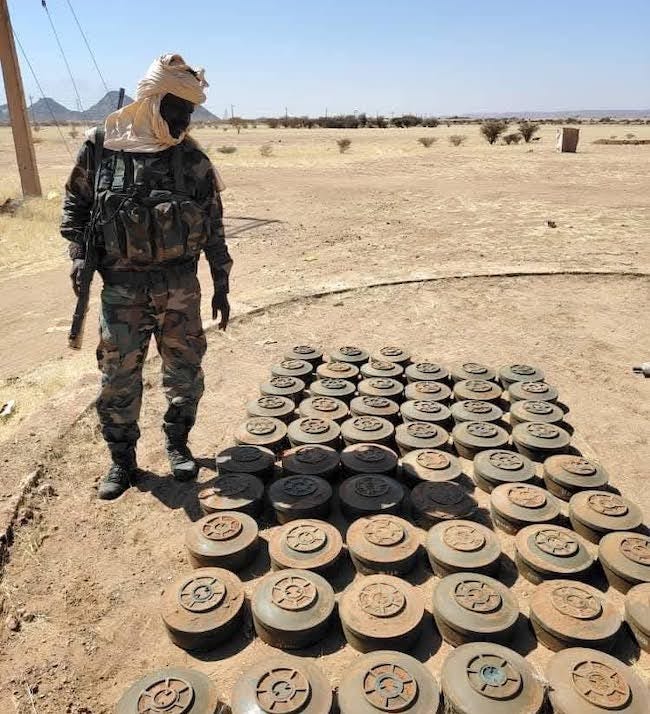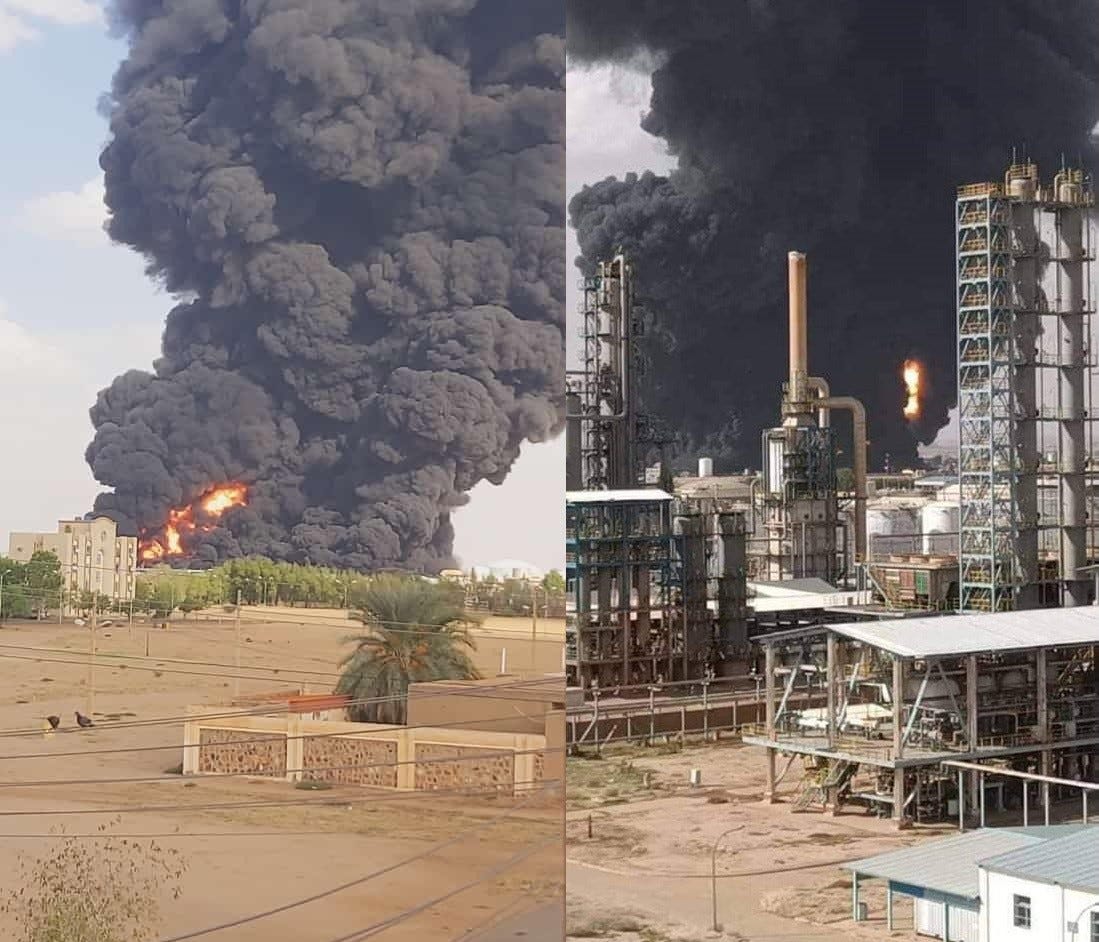Battle for Khartoum refinery intensifies
Toxic fumes fill air throughout Sudan's capital region

Thick black smoke filled the air over Sudan’s capital Khartoum yesterday after an explosion at a refinery complex north of the city, coinciding with fierce fighting for control of the Garri industrial zone.
Sudan’s army is advancing on the Garri Refinery from both north and south. On the northern axis, troops based in River Nile State must cross harsh desert terrain, risking minefields and ambushes by the Rapid Support Forces (RSF), the renegade paramilitary that has battled for control of Sudan since April 2023.
Yesterday, SAF captured the rocky Jebel Jari area, located 15 km north of the refinery, according to videos filmed by SAF troops. The area is known for military tunnels used for storing weapons and munitions. The allied Joint Force and Al-Baraa bin Malik, an Islamist paramilitary, are supporting the Sudanese army along this axis.
Meanwhile, on the southern axis, SAF troops coming from Khartoum Bahri have advanced through northern suburbs and outlying villages of the city, reaching to within 14 km of Garri, according to geolocated video. SAF’s advance in this region was helped by the capture of the Halfaya Bridge in September, an operation that linked forces in Omdurman with a besieged group in northern Bahri. Since then, the RSF increasingly have lost ground in Bahri, which is the sister city of the capital Khartoum.

The battle for the Garri Refinery highlights the catastrophic impact of the war on Sudan’s economy and infrastructure. The refinery was Sudan’s largest, providing about 45% of the country’s petroleum products. Its destruction makes Sudan dependent on imported fuel, despite being a producer of crude oil.
For background, RSF troops based at the Garri Refinery have anchored the paramilitary’s northern defense of the capital region, using the industrial area as a base of operations from which to repulse attacks from SAF-controlled River Nile State. The RSF had seized the refinery in the first days of the war. They have used fuel depots at the refinery to feed their war machine. However, the refinery has suffered extensive damage, whether because of airstrikes or unmaintained equipment.
The warring parties blamed each other for the latest fire.

In related news, fighting continues in Bahri itself, including in the residential Shambat Extension, and the Light Industrial Area. In recent weeks, SAF advanced south from Halfaya, gaining ground. Earlier this week, they captured the African Council Schools complex in Hai al Safia, and the Hassan Ibrahim Malik dormitories, according to videos geolocated by Sudan War Monitor.
This puts them within three kilometers of the besieged Kober pocket (“Signal Corps”), which connects to General Command via a rail bridge. If they can close this gap, they will end the nearly two-year siege of the SAF headquarters.
Environmental and health impacts
The smoke from the Garri Refinery, which blanketed the capital region, could have serious impacts on public health and the environment. Dr. Hamid Suleiman, former undersecretary of the Ministry of Energy, told Radio Dabanga that such fires emit harmful gases, such as sulfur dioxide, nitrogen oxide, and carbon monoxide, which cause severe damage to the respiratory system.
He said that gasoline particles and their various compounds cause long-term damage to the liver, kidneys, and nervous system. Petroleum fires also can cause temporary health damage such as headaches and loss of consciousness. Dr. Suleiman further warned of the harmful environmental effects on the air, water, and soil.
A video purportedly from the refinery showed a huge explosion before dawn.
Monitoring group blames SAF
The human rights group Emergency Lawyers blamed the Sudanese Armed Forces for the fire at the refinery, saying they bombed the only remaining fuel depot at the RSF-controlled refinery, causing its complete destruction.
Emergency Lawyers said the RSF have systematically exploited the refinery by forcing workers to operate it, and pointed out that its fuel was used to support its military operations, in addition to selling it on the black market. It considered this a clear exploitation of public resources in violation of national and international laws.
Emergency Lawyers also explained that SAF targeted the vital facility with air and artillery bombardment during different periods in 2023. The lawyers said that this caused catastrophic damage, including the disruption of the main control unit and the complete shutdown of the main gasoline production station in June 2023. Emergency Lawyers held both parties fully responsible for this systematic destruction, saying this constitutes a clear violation of the economic and social rights of the Sudanese people.
Power outages
Elsewhere, large parts of Sudan have suffered power outages after drone attacks on infrastructure. Power stations in Kassala, Kosti, and Merowe suffered fires due to suspected drone attacks. River Nile and Red Sea states, Gedaref, Kassala, and Sennar were all plunged into darkness.
Omdurman also suffered a ten-day outage. Residents there reported that bakeries were shut down and that people had resorted to drawing water from the Nile River.
The United Nations expressed concern over the attacks. The deputy spokesperson of the Secretary General, Farhan Haq, said the warring parties have an obligation not to attack objects indispensable to the survival of the civilian population. “They must also take all feasible precautions to avoid and minimize incidental civilian harm,” he said.
News in Brief
For the first time in over a year, UN World Food Programme trucks arrived in Wad Madani, carrying enough food to feed 30,000 people for a month. The Sudanese military had blocked food deliveries to the city while it was under RSF control.
The UN Office for the Coordination of Humaniarian Affairs reported high malnutrition rates, food shortages, and widespread health needs in Wad Madani, capital of Al-Jazira State, which was recaptured by the SAF two weeks ago.
The Wad Medani Teaching Hospital is severely damaged and barely functional, with most care units destroyed and all pharmacies looted or destroyed. The blood bank has been destroyed and most departments (surgery, psychiatric, ophthalmology, dental and children's) are not operational.
Unexploded ordnance contamination is widespread in Wad Madani.
UN Resident and Humanitarian Coordinator Clementine Nkweta-Salami expressed grave concerns over imminent threat to civilians after the RSF threatened an attack El Fasher, attempting to end the nine-month siege. The RSF continued to shell Abu Shouk camp in northern El Fasher.
SAF warplanes attacked herds of livestock in Blue Nile and Sennar states. Pastoralists in the area are accused of supporting the RSF.
SAF airstrikes also were reported on the frontline between White Nile and North Kordofan, east of Um Ruwaba.

